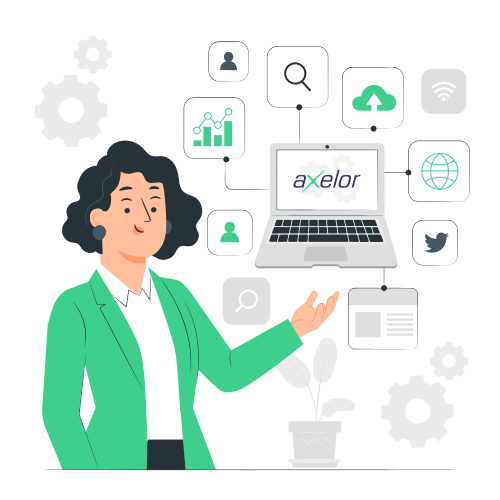ERP for Construction
ERP for Construction: Definition and Benefits for Making the Right Choice
Summary
What is an ERP Specialized in Construction?
An ERP (Enterprise Resource Planning) specialized in the construction sector (BTP – Building and Public Works) is an integrated management system specifically designed to meet the unique needs and challenges of the industry. This type of software is designed to help businesses efficiently plan, manage, and control their construction sites, resources, and operations.
Here are some key features of an ERP specialized in construction:

Business Management: The ERP allows for managing the entire project lifecycle, from initial planning to execution, including monitoring costs, timelines, and resources.
Human and Material Resource Management: It facilitates the control of human resources, including workforce scheduling, skills tracking, and monitoring of worked hours. It also enables the management of material capacities such as equipment, vehicles, and materials.
Cost and Profitability Tracking: The software provides tools for detailed expense tracking, enabling organizations to control budgets, identify cost overruns, and optimize profits.
Tender and Bid Management: It allows for managing tenders, creating quotes, and bidding on projects by providing expense calculation functionalities and margin management.
Site Planning and Monitoring: It enables the planning of tasks and activities on construction sites, tracking work progress, and managing deadlines.
Subcontracting Monitoring: It facilitates the management of subcontractors and suppliers, including tracking contracts, payments, and performance.
Compliance and Safety Management: It can help track health and safety regulations on construction sites and ensure compliance with local standards and regulations.
Reports and Analytics: It provides tools for generating customized reports and data analytics to assess performance and make informed decisions.
Why Implement an ERP for the Construction Industry?
Implementing an ERP software specifically designed for Building and Public Works offers numerous benefits that justify its adoption by companies. Here are some key reasons for implementing this type of solution for the construction industry:
- Project Management Optimization: An ERP tool allows for efficient organization, from the design phase to execution, by integrating control over resources, tasks, and timelines. This ensures better coordination and smoother execution of actions.
- Price Control: It helps to accurately track prices related to materials, labor, equipment, and subcontractors. It allows for quick detection of budget overruns and the implementation of corrective measures.
- Resource Management: Organizations can effectively plan and manage their human, material, and financial resources. This includes tracking employees, skills, equipment, and material inventories.
- Profitability Improvement: By streamlining operations and optimizing expenses, an ERP tool contributes to improving the efficiency of construction sites, which is essential for the economic viability of companies.


- Deadline Monitoring: It allows for close tracking of deadlines and timelines, which reduces potential delays and improves customer satisfaction.
- Compliance and Safety: It often includes features to ensure compliance with safety standards and regulations specific to the industry.
- Reports and Analytics: ERP systems offer advanced reporting and analytics capabilities, allowing leaders to make informed decisions based on accurate figures.
- Error Reduction: Automation of actions and centralization of data reduce the risk of human errors in project and business management.
- Better Collaboration: It facilitates collaboration among teams in the field, in the office, and with subcontractors, improving communication and overall productivity.
What are the Features of an ERP in the Construction Industry?
ERPs specifically designed for the construction industry offer a wide range of specific modules to meet the unique needs of this industry. Here are some of the main applications in the field of building:
- Project Management: Comprehensive tracking of the lifecycle of actions, from initial planning to completion, including budgeting, organizing resources, and monitoring timelines.
- Resource Organization: Management of human, material, and financial resources, including workforce scheduling, tracking of skills, equipment, and supplies.
- Cost Management: Detailed tracking of purchases related to materials, labor, equipment, and subcontractors, enabling proactive budget control.
- Subcontractor Control: Managing contracts with subcontractors, tracking performance and payments, as well as the ability to integrate subcontractors into the system.
- Tender and Bid Management: Creation of detailed quotes, bidding on projects, calculation of expenses and margins.
- Site Planning and Monitoring: Tracking activities on construction sites, monitoring project progress, tracking deadlines, and compliance with safety standards.
- Regulatory Compliance: Feature to ensure that operations comply with local regulations, safety standards, and legal requirements of the industry.


- Document Management: Centralized storage of documents and construction plans, facilitating access to and sharing of information.
- Asset Tracking: Monitoring of equipment and assets, tracking of preventive and corrective maintenance.
- Customer Relationship Management (CRM): Monitoring relationships with clients, prospects, offers, and contracts through CRM.
- Reports and Analytics: Advanced reporting and analysis capabilities to assess performance, identify trends, and make informed decisions.
- Financial Integration: Integration of financial statistics, accounting, and expense control for a comprehensive view of profits.
- Quantity Management: Tracking material inventory levels, orders, and deliveries.
- Mobility: Mobile functionalities to enable field teams to enter data and communicate in real time with the ERP system.
- Business Process Automation: Automation of repetitive tasks and workflows to improve operational efficiency.
What are the Benefits of an ERP for the Construction Industry?
Adopting an ERP software in the construction industry (Building and Public Works) offers numerous benefits. Here are some of the key advantages of an ERP:
- Comprehensive Project Control: An ERP allows for the centralization and management of all aspects of a project, from scheduling to budgeting to execution. This ensures efficient coordination and overall visibility.
- Profitability Optimization: It provides accurate tracking of prices related to materials, labor, and equipment, enabling maximization of profits.
- Deadline Control: Scheduling and activity tracking modules help meet deadlines and minimize delays, thus improving customer satisfaction.
- Resource Tracking: It enables efficient management of human, material, and financial resources, optimizing the use of available means.
- Subcontractor Management: Construction companies can effectively manage contracts with subcontractors, track performance, and ensure compliance with contractual obligations.
- Regulatory Compliance: It incorporates features to ensure compliance with safety standards on construction sites, local regulations, and legal requirements.


- Document Management: Centralized storage of documents and construction plans, facilitating access to and sharing of information.
- Reports and Analytics: ERP systems offer advanced reporting and analysis capabilities, enabling informed decision-making based on accurate data.
- Error Reduction: Automation reduces the risk of human errors in business planning and operations.
- Mobility: Mobile applications enable field teams to enter information in real time and communicate effectively.
- Process Automation: Repetitive tasks and workflows are automated, improving operational efficiency.
- Financial Integration: Integration of financial data, accounting, and expenses for full visibility into profitability.
- Inventory Management: Tracking material supply levels, orders, and deliveries.
- Collaboration Improvement: ERPs facilitate collaboration among field teams, office staff, and subcontractors, enhancing communication and overall productivity.
Which Companies Need an ERP?
An ERP is an integrated management software package that can benefit a wide range of groups, regardless of their size or industry. Generally, organizations that can benefit from an ERP are those with complex and diversified operational procedures, as well as needs for resource control, performance monitoring, and advanced data tracking. Here are some types of companies that typically need such a solution:
- Manufacturing Companies: Companies that produce physical goods often have needs for supply chain control, production, inventory tracking, and production scheduling.
- Distribution Companies: Businesses that sell products need to effectively manage their supply chain, procurement, orders, and customer relationships.
- Service Companies: Law firms, consulting firms, and marketing agencies can use an ERP to manage their human resources, billing, work hours tracking, and project management.
- Construction Companies: They need an ERP to manage the organization of actions, resources, budgeting, and expense tracking.
- Retail Companies: Retailers can use an ERP to manage sales, inventory, suppliers, and customer relationships.


- Healthcare Groups: Hospitals, clinics, and healthcare facilities need to manage medical records, appointments, billing, and revenue control.
- Custom Manufacturing Companies: Those that produce custom products, such as custom furniture manufacturers, can benefit from an ERP to manage specific orders and custom production.
- High-Tech Companies: Technology businesses need to manage the design, development, production, and sale of complex technological products.
- Financial Services: Financial institutions, such as banks and wealth management firms, can use an ERP to manage accounting, portfolio tracking, and regulatory compliance.
- Multinational Firms: Firms operating in multiple countries need an ERP to manage operations, finances, and compliance across different countries and jurisdictions.
How to Choose the Ideal ERP for Your Construction Company?
Choosing the ideal solution for a construction company is a crucial decision that requires thorough analysis and a clear understanding of the company’s specific needs. Here are some steps to follow to choose the ideal ERP for your company:
- Assessment of Specific Needs: Precisely identify the needs and challenges of your construction company. This includes project management, resource management, regulatory compliance, and any other aspect essential to your business.
- Stakeholder Consultation: Involve key stakeholders in your company, including business managers, site managers, accountants, and administrators, in the selection process. Their feedback is valuable for understanding the specific needs of each department.
- Budgeting: Determine the budget allocated for the purchase, implementation, and maintenance of the ERP. Consider the costs of licenses, training, customization, and technical support.
- ERP Vendor Research: Identify vendors specialized in the construction industry. Look for providers who have proven experience in this field and a good reputation.
- Feature Analysis: Examine in detail the applications offered by each solution. Ensure they meet your specific needs, including budgeting, resource allocation, site scheduling, subcontractor tracking, invoicing, etc.


- Customization: Check if the ERP can be customized to meet the unique needs of your business. The ability to customize is crucial for adapting the system to your internal organizations.
- Integration with Other Systems: Ensure that it can easily integrate with other systems already in place within your company, such as accounting, payroll, and design software.
- Ease of Use: Assess the user interface’s usability. A user-friendly interface is essential for facilitating adoption by end users.
- Support and Training: Inquire about the level of technical support and training offered by the provider. Adequate training is essential for maximizing the software’s use.
- References and Feedback: Ask the supplier for customer references and contact them to get feedback on the tool’s use in organizations similar to yours.
- Demo and Trial: Request a demonstration and, if possible, a free trial to evaluate the system under real conditions.
- Profitability Analysis: Assess how the ERP will contribute to improving your company’s profit by reducing expenses, optimizing operations, and increasing efficiency.
Which ERP Software to Use for Your Construction Company?
For a construction company, Axelor offers a specialized solution that can effectively meet your specific needs. Axelor’s Open Source ERP provides advanced functionalities for project management, resource management, cost and invoicing, and more. It also allows customization to precisely fit your internal business processes. With a user-friendly interface, easy integration with other systems, and robust technical support, Axelor’s Low Code ERP software is an option worth considering to optimize your operations in the construction sector.
Discover how our ERP can help improve your company’s performance
An expert will contact you shortly to discuss your project.